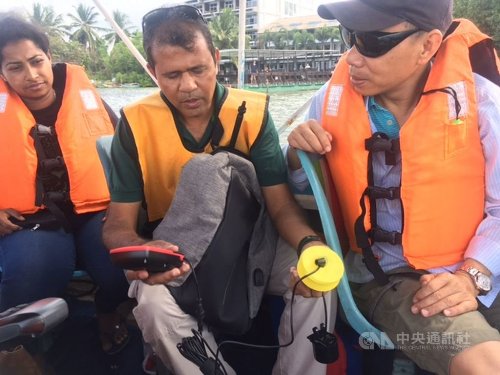Taiwan launches marine resources research center in Sri Lanka
New Delhi, March 7 (CNA) A research team from National Sun Yat-sen University (NSYSU) in Kaohsiung, southern Taiwan has recently visited Sri Lanka to open a research center there for studies on the effects of climate change on marine resources and biosystems.
The university was selected by Taiwan’s Ministry of Science and Technology (MOST) last year to set up the Taiwan-Sri Lanka Environmental Change Sciences and Technology Innovation Center at the University of Sri Jayewardenepura in Sri Lanka to carry out studies on marine life, according to the Taipei Economic and Cultural Center (TECC) in India.
The TECC represents Taiwan’s interests in India in the absence of diplomatic links between the two countries.
The NSYSU team, comprising 11 professors and researchers specializing in marine life-related areas, opened the center Feb. 25, Chen Ho-hsien (陳和賢), head of the TECC’s technology division, said Wednesday.
Chen said that the center was established because the protection of marine life resources and marine biosystems has become increasingly important in both Taiwan and Sri Lanka amid rising concerns over global warming, ocean acidification and environmental change.
The center will play an instrumental role in enhancing exchanges between the two countries in marine life and ocean studies, and relevant studies carried out by the center are expected to help Taiwan and Sri Lanka to cope with the challenges of global environmental change, he added.
After the opening ceremony, the research team led by Hung Chin-chang (洪慶章), deputy head of NSYSU’s College of Marine Sciences, remained in Sri Lanka for research work that lasted until March 2.
The researchers took marine life samples from wetlands, estuaries and bays near Negombo Lagoon, a large estuarine lagoon in southwest Sri Lanka, and carried out a 36-hour observation of carbon dynamics in the lagoon to evaluate carbon dioxide pressure changes, Chen said.
They also took samples of Nypa fruticans, commonly known as the nipa palm or mangrove palm, a species of palm native to the coastlines and estuarine habitats of Southeast Asia and India.
Chiang Yu-chung (江友中), head of NSYSU’s Department of Biological Sciences, will collaborate with Sri Lanka’s University of Ruhuna to conduct studies on the species, Chen added.
Meanwhile, Liaw Chih-chuang (廖志中), head of NSYSU’s Department of Marine Biotechnology and Resources, collected soil samples from the mangrove forest area in Sri Lanka for microbiological analysis.
After returning to Taiwan, Liaw will compare the microbiome with that collected from mangrove areas in Taiwan in preparation for breeding specific mangrove microorganisms with certain active functions, according to Chen.
In addition, the research team met with Sri Lanka’s Minister of Health, Nutrition and Indigenous Medicine Rajitha Senaratne to discuss the possibility of NSYSU providing assistance to Sri Lanka in plant genome analysis to help the conservation of biological resources in the country.
The team concluded its research in Sri Lanka March 2 and returned to Taiwan to continue follow-up research, Chen said.


 ITU
ITU